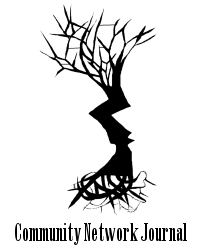by John Green
Born August 24, 1977 (47 years old)
Summary: There is a reward for missing fugitive billionaire Russell Pickett, so Aza and her friend Daisy look for him. It turns out she used to know his son Davis Pickett. Aza also suffers from OCD. In this case her obsessiveness is distinctly unhelpful, hijacking the mystery itself. The book explores different kinds of love. This includes romance, friendship, love from parents, etc. It also explores the question of how a person distinguishes their “self” as a distinct thing. Is a person merely the byproduct of their circumstances? This question fuels the character’s anxiety-ridden thought spirals.
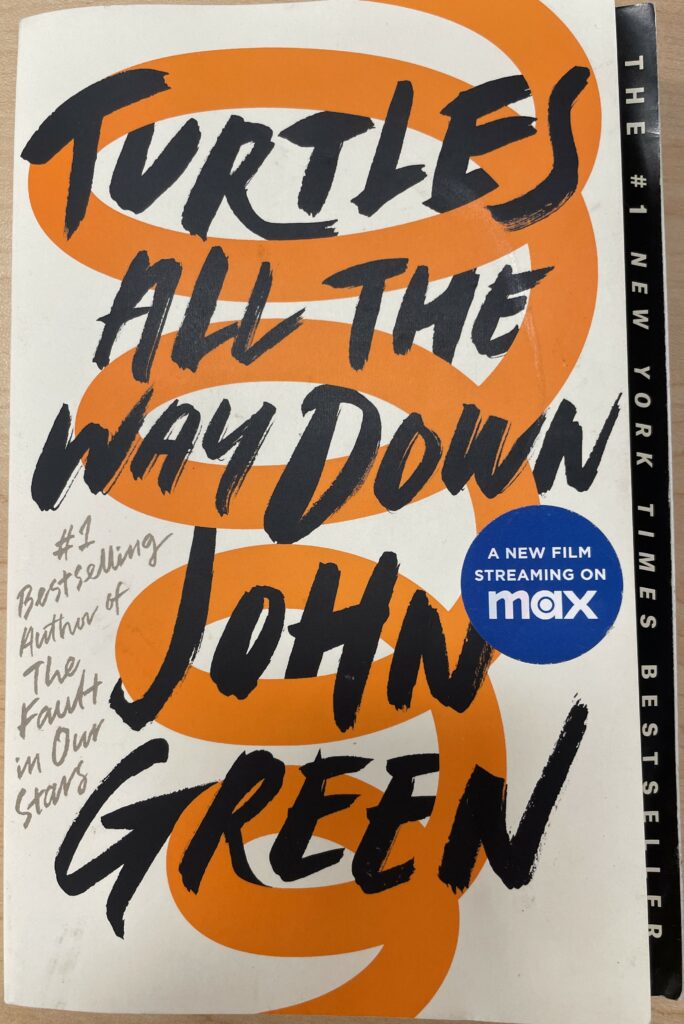

Man can do what he wills, but cannot will what he wills.
-Arthur Schopenhauer
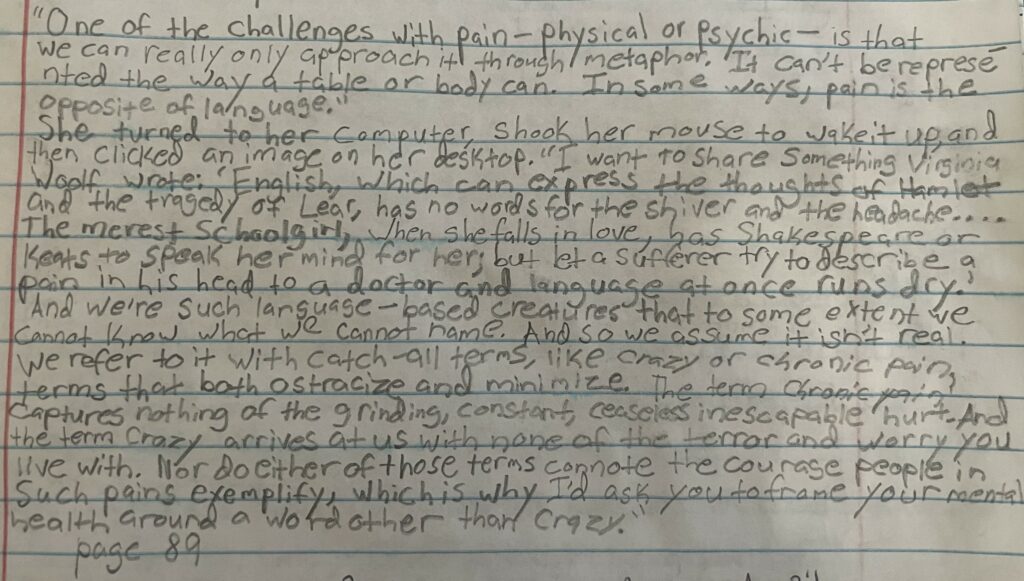
“One of the challenges with pain – physical or psychic – is that we can only approach it through metaphor. It can’t be represented the way a table or body can. In some ways, pain is the opposite of language.”
She turned to her computer, shook her mouse to wake it up, and then clicked an image on her desktop. “I want to share something Virginia Woolf wrote: ‘English, which can express the thoughts of Hamlet and the tragedy of Lear, has no words for the shiver and the headache… The merest schoolgirl, when she falls in love, has Shakespeare or Keats to speak her mind for her; but let a sufferer try to describe a pain in his head to a doctor and language at once runs dry.’
And we’re such language-based creatures that to some extent we cannot know what we cannot name. And so we assume it isn’t real. We refer to it with catch all terms, like crazy or chronic pain, terms that both ostracize and minimize. The term chronic pain, captures nothing of the grinding, constant, ceaseless inescapable hurt. And the term crazy arrives at us with none of the terror and worry you live with. Nor do either of those terms connote the courage people in such pains exemplify, which is why I’d ask you to frame your mental health around a word other than crazy.”
Page 89

“I guess I just don’t like having to live inside of a body? If that makes sense. And I think maybe deep down I am just an instrument that exists to turn oxygen into carbon dioxide, just like merely an organism in this… vastness. And it’s kind of terrifying to me that what I think of as, like my quote unquote self isn’t really under my control? Like, as I’m sure you’ve noticed, my hand is sweating right now, even though it’s too cold for sweating, and I really hate that once I start sweating, I can’t stop and then I can’t think about anything else except for how I’m sweating. And if you can’t pick what you do or think about, then maybe you aren’t really real, you know? Maybe I’m just a lie that I’m whispering to myself.”
Pages 104-105
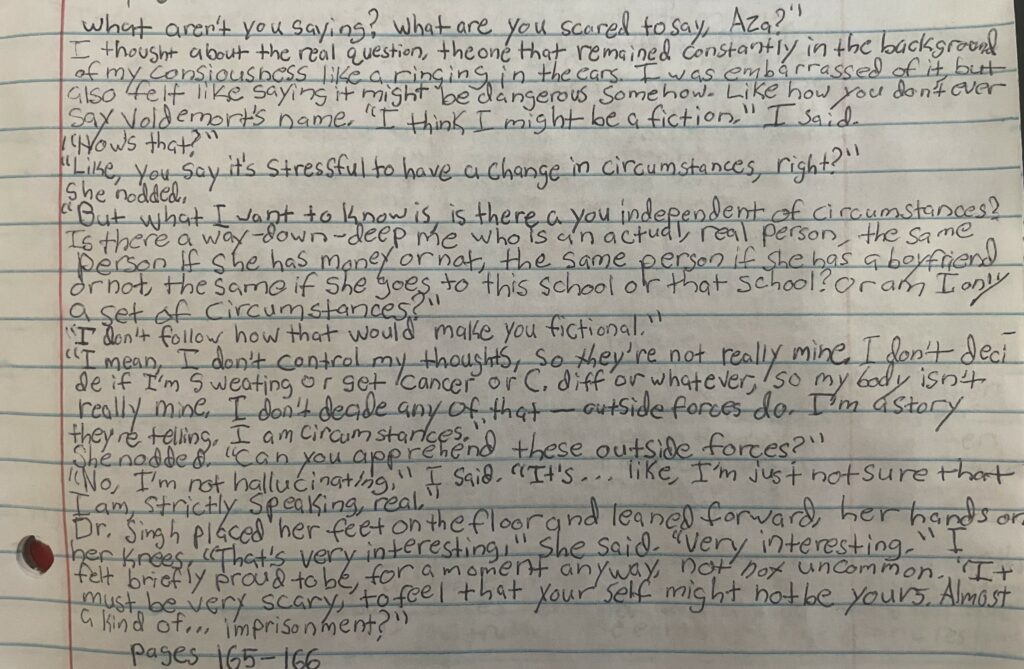
“What aren’t you saying? What are you scared to say, Aza?”
I thought about the real question, the one that remained constantly in the background of my consiousness like a ringing in the ears. I was embarrassed of it, but also felt like saying it might be dangerous somehow. Like how you don’t ever say Voldemort’s name. “I think I might be a fiction.” I said.
“How’s that?”
“Like, you say it’s stressful to have a change in circumstances, right?”
She nodded.
“But what I want to know is, is there a you independent of circumstances? Is there awy-down-deep me who is an actual, real person, the same person if she has money or not, the same person if she has a boyfriend or not, the same if she goes to this school or that school? Or am I only a set of circumstances?”
“I don’t follow how that would make you fictional.
“I mean, I don’t control my thoughts, so they’re not really mine. I don’t decide if I’m sweating or get cancer or c. diff or whatever, so my body isn’t really mine. I don’t decide any of that – outside forces do. I’m a story they’re telling, I am circumstances.”
She nodded. “can you aprehend these outside forces?”
“No, I’m not hallucinating,” I said. “It’s… like, I’m just not sure that I am strictly speaking, real.”
Dr. Singh placed her feet on the floor and leaned forward, her hands on her knees. “That’s very interesting,” she said. “Very interesting.”
I felt briefly proud to be, for a moment anyway, not not uncommon. ‘It must be very scary, to feel that your self might not be yours. Almost a kind of… imprisonment?”
Pages 165-166
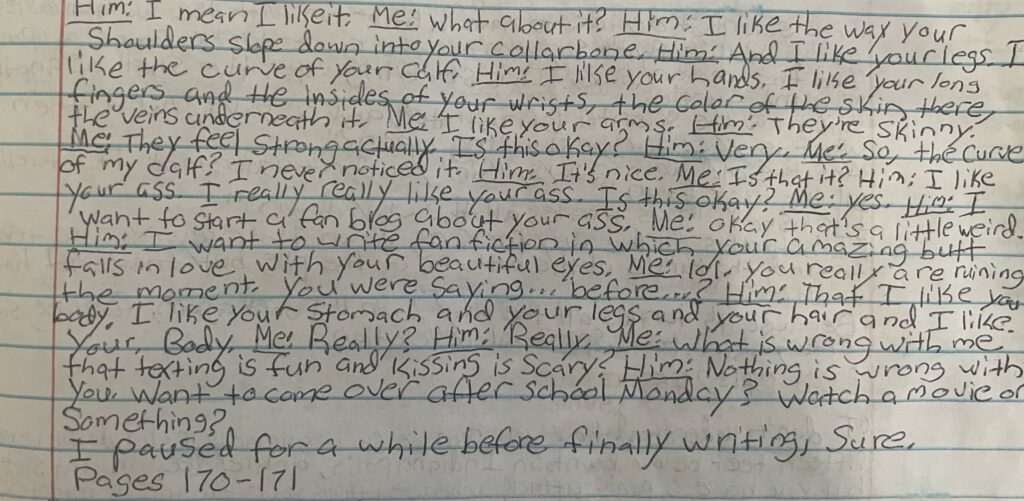
[In the book this is an exchange of text messages.]
Him: I mean I like it.
Me: What about it?
Him: I like the way your shoulders slope down into your collarbone.
Him: And I like your legs. I like the curve of your calf.
Him: I like your hands. I like your long fingers and the insides of your wrists, the color of the skin there, the veins underneathe it.
Me: I like your arms.
Him: They’re skinny.
Me: They feel strong actually. Is this okay?
Him: Very.
Me: So, the curve of my calf? I never noticed it.
Him: It’s nice.
Me: Is that it?
Him: I like your ass. I really really like your ass. Is this okay?
Me: Yes.
Him: I want to start a fan blog about your ass.
Me: okay that’s a little weird.
Him: I want to write fanfiction in which your amazing butt falls in love with your beautiful eyes.
Me: lol. you really are ruining the moment. You were saying… before…?
Him: That I like your body. I like your stomach and your legs and your hair and I like. Your. Body.
Me: Really?
Him: Really.
Me: What is wrong with me that texting is fun and kissing is scary?
Him: Nothing is wrong with you. Want to come over after school Monday? Watch a movie or something?
I paused for a while before finally writing, Sure.
Pages 170-171
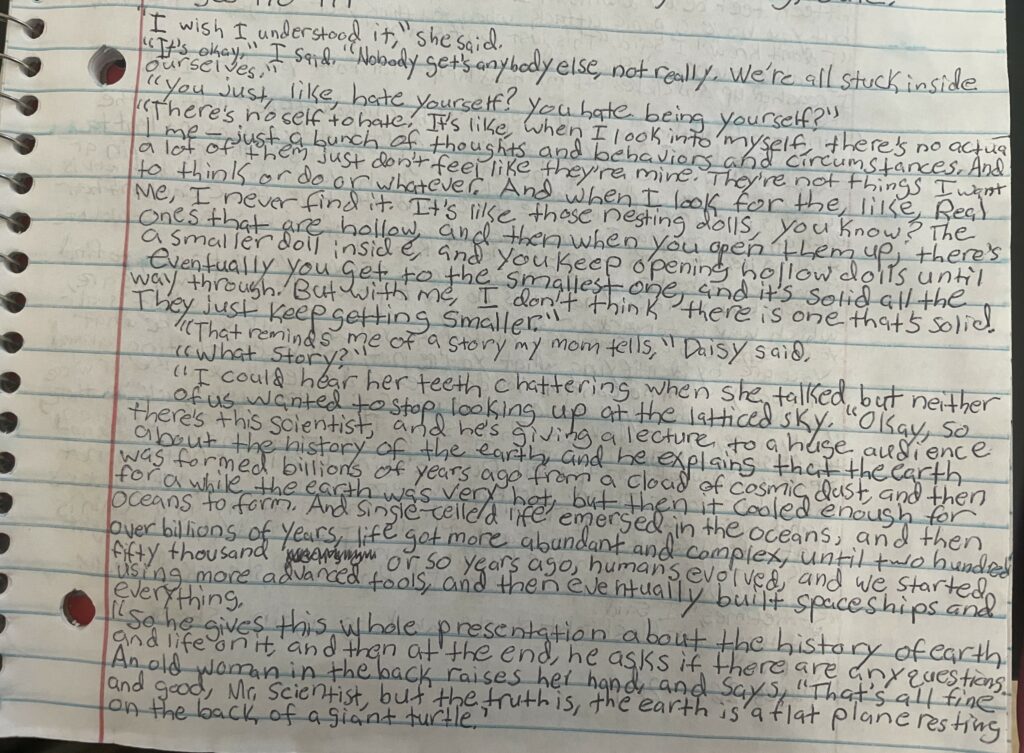
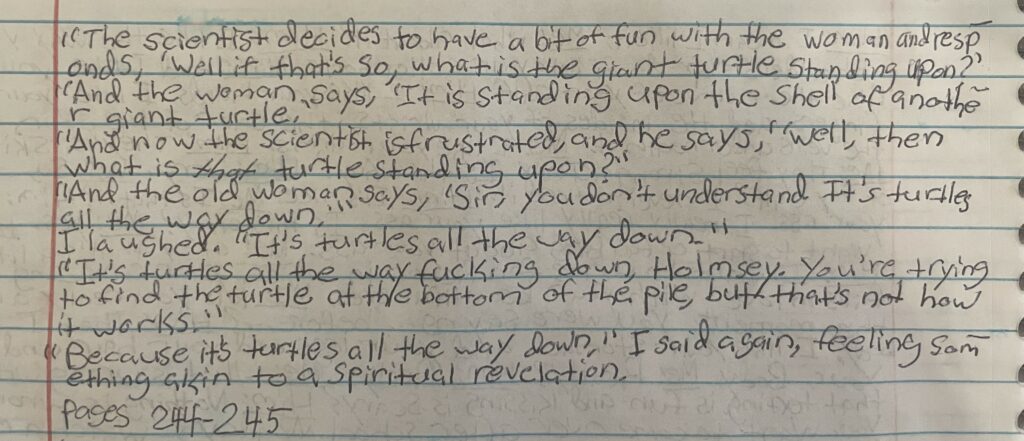
“I wish I understood it,” she said.
“It’s okay,” I said. “Nobody get’s anybody else, not really. We’re all stuck inside ourselves.”
“You just, like, hate yourself? You hate being yourself?”
“There’s no self to hate. It’s like, when I look into myself, there’s no actual me – just a bunch of thoughts and behaviors and circumstances. And a lot of them just don’t feel like they’re mine. They’re not things I want to think or do or whatever. And when I look for the, like, Real Me, I never find it. It’s like those nesting dolls, you know? The ones that are hollow, and then when you open them up, there’s a smaller doll inside, and you keep opening hollow dolls until eventually you get to the smallest one, and it’s solid all the way through. But with me, I don’t think there is one that’s solid. They just keep getting smaller.”
“That reminds me of a story my mom tells,” Daisy said.
“What story?”
I could hear her teeth chattering when she talked but neither of us wanted to stop looking up at the latticed sky. “Okay, so there’s this scientist, and he’s giving a lecture to a huge audience about the history of the earth, and he explains that the earth was formed billions of years ago from a cloud of cosmic dust, and then for a while the earth was very hot, but then it cooled enough for oceans to form. And single-celled life emerged in the oceans, and then over billions of years, life got more abundant and complex until two hundred fifty thousand or so years ago, humans evolved, and we started using more advanced tools, and then eventually built spaceships and everything.
“So he gives this whole presentation about the history of earth and life on it, and then at the end, he asks if there are any questions. An old woman in the back raises her hand, and says, “That’s all fine and good, Mr. Scientist, but the truth is, the earth is a flat plane resting on the back of a giant turtle.’
“The scientist decides to have a bit of fun with the woman and responds, ‘Well if that’s so, what is the giant turtle standing upon?”
“And the woman says, “It is standing upon the shell of another giant turtle,’
“And now the scientist is frustrated, and he says, “Well, then what is that turtle standing upon?”
“And the old woman says, ‘Sir, you don’t understand. It’s turtles all the way down.'”
I laughed. “It’s turtles all the way down.”
“It’s turtles all the way fucking down, Holmsey. You’re trying to find the turtle at the bottom of the pile, but that’s not how it works.”
“Because it’s turtles all the way down,” I said again, feeling something akin to a spiritual revelation.
Pages 244-245
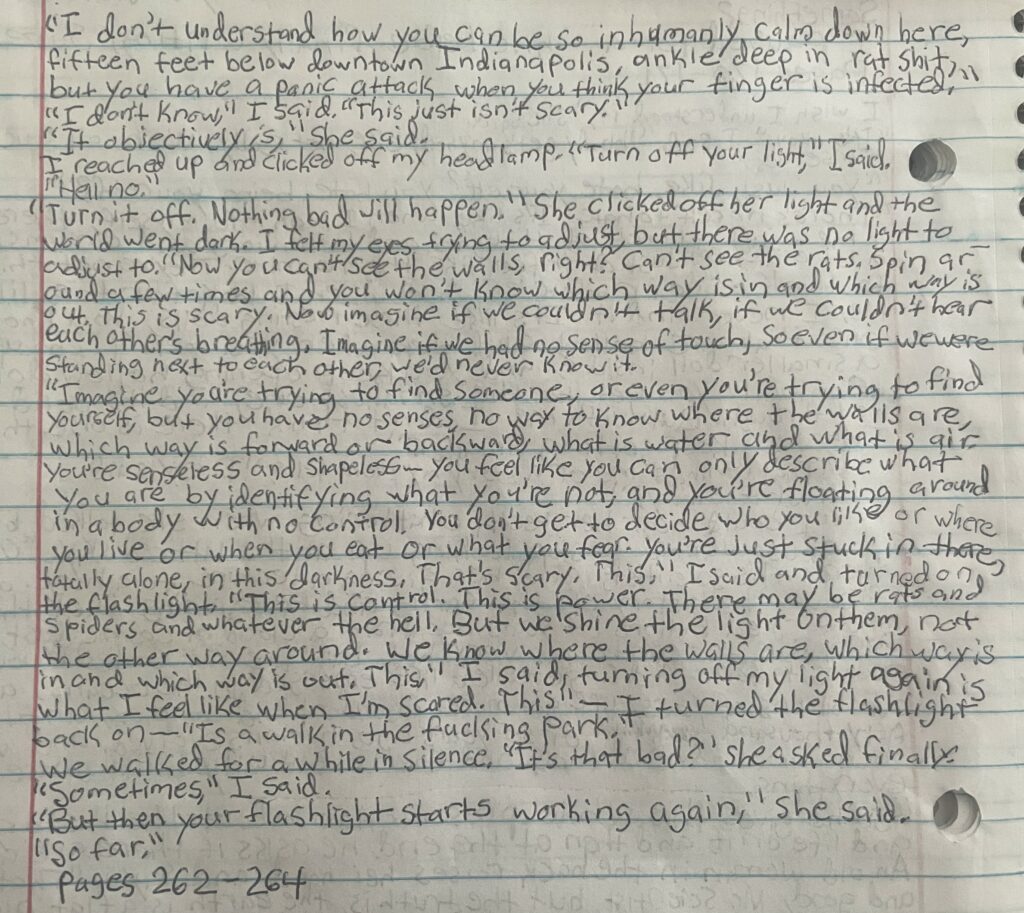
“I don’t understand how you can be so inhumanly, calm down here, fifteen feet below downtown Indianapolis, ankle deep in rat shit, but you have a panic attack when you think your finger is infected.'”
“I don’t know,” I said. “This just isn’t scary.”
“It objectively is,” she said.
I reached up and clicked off my headlamp, “Turn off your light,” I said.
“Hell no.”
“Turn it off. Nothing bad will happen.” She clicked off her light and the world went dark. I felt my eyes trying to adjust, but thtere was no light to adjust to. “Now you can’t see the walls, right? Can’t see the rats. Spin around a few times and you wno’t know which way is in and which is out. This is scary. Now imagine if we couldn’t talk, if we couldn’t hear each other’s breathing. Imagine if we had no sense of touch, so even if we were standing next to each other, we’d never know it.
“Imagine you’re trying to find someone, or even you’re trying to find yourself, but you have no senses, no way to know where the walls are, which way is forward or backward, what is water and what is air. You’re senseless and shapeless – you feel like you can only describe what you are by idenitfying what you’re not, and you’re floating around in a body with no control. You don’t get to decide who you like or where you live or when you eat or waht you fear. You’re just stuck in there, totally alone, in this darkness. That’s scary. This,” I said and turned on the flashlight, “This is control. This is power. There may be rats and spiders and whatever the hell. But we shine the light on them, not the other way around. We know where the walls are, which way is in and which way is out. This” I said, turning off my light again is what I feel like when I’m scared. This” – I turned the flashlight back on – “Is a walk in the fucking park.”
We walked for a while in silence. “It’s that bad?” She asked finally. “Sometimes,” I said.
“But then your flashlight starts working again,” she said.
“So far.”
Pages 262-264
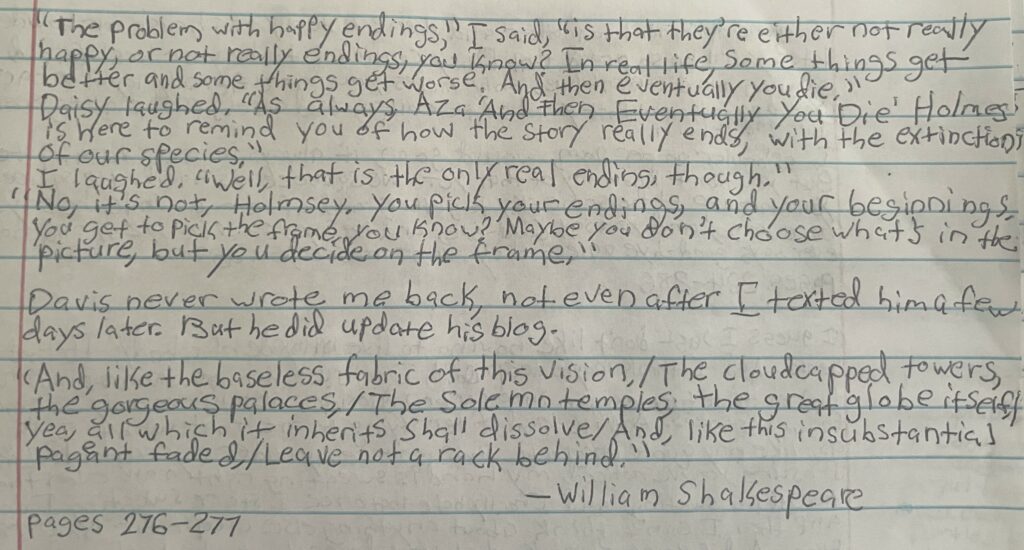
“The problem with happy endings,” I said, “is that they’re either not really happy, or not really endings, you know? In real life, some things get better and some things get worse. And then eventually you die.”
Daisy laughed. “As always, Aza ‘And Then Eventually You Die’ Holmes is here to remind you of how the story really ends, with the extinction of our species.”
I laughed. “Well, that is the only real ending, though.”
“No, it’s not, Holmsey. You pick your endings, and your beginnings. You get to pick the frame, you know? Maybe you don’t choose what’s in the picture, but you decide on the frame,”
Davis never wrote me back, not even after I texted him a few days later. But he did update his blog.
“And, like the baseless fabric of this vision,/The cloudcapped towers, the gorgeous palaces,/The solemn temples, the great globe itself,/Yea, all which it inherits shall dissolve/And, like this insubstantial pageant faded,/Leave not a rack behind.”
-William Shakespeare
Pages 276-277

As I washed and rebandaged it in the bathroom, I stared at myself. I would always be like this, always have this within me. There was no beating it. I would never slay the dragon, because the dragon was also me. Myself and my disease were knotted together for life.
I was thinking about Davis’s journal, of that Forst quote, “In three words I can sum up everything I’ve learned about life – it goes on.”
Page 280

I missed Davis, of course. The first few days, I kept checking my phone, waiting for him to reply, but slowly I understood that we were going to be a part of each other’s past. I still missed him, though. I missed my dad, too. And Harold. I missed everybody. To be alive is to be missing.
Page 281
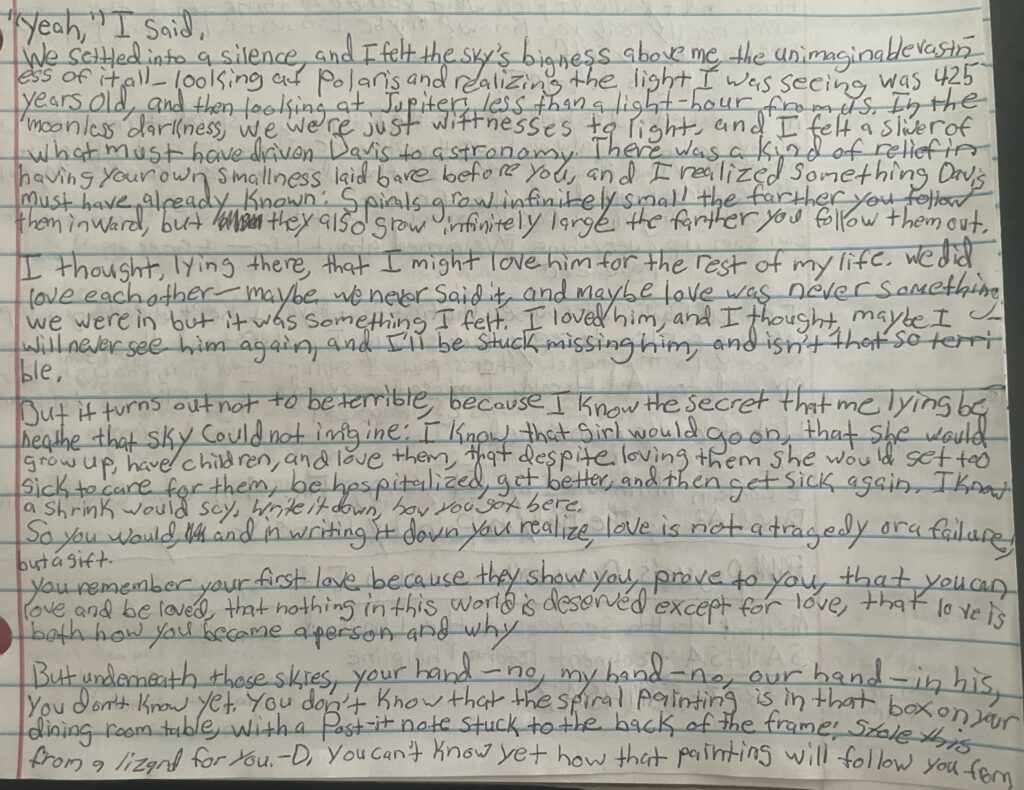
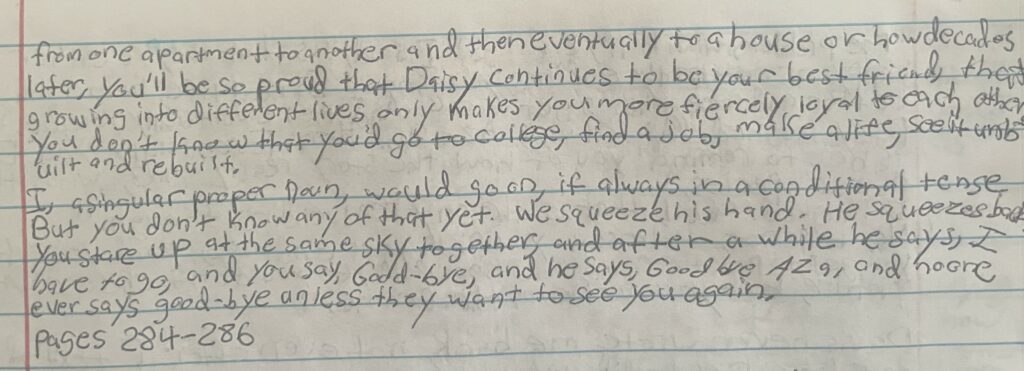
“Yeah,” I said.
We settled into a silence, and I felt the sky’s bigness above me, the unimaginable vastness of it all – looking at Polaris and realizing the light I was seeing was 425 years old, and then looking at Jupiter less than a light – hour from us. In the moonless darkness, we were just wittnesses to light, and I felt a sliver of what must have driven Davis to astronomy. There was a kind of relief in having your own smallness laid bare before you, and I realized something Davis must have already known: Spirals grow infinitely small the farther you follow them inward, but they also grow infinitely large the farther you follow them out.
I thought, lying there, that I might love him for the rest of y life. We did love each other – maybe we never said it, and maybe love was never something we were in but it was something I felt. I loved him, and I thought, maybe I will never see him again, and I’ll be stuck missing him, and isn’t that so terrible.
But it turns out not to be terrible, because I know the secret that me lying beneathe that sky could not imagine: I know that girl would go on, that she would grow up, have children, and love them, that despite loving them she would get too sick to care for them, be hospitalized, get better, and then get sick again. I know a shrink would say, write it down, how you got here.
So you would, and in writing it down you realize, love is not a tragedy or a failure, but a gift.
You remember your first love because they show you, prove to you, that you can love and be loved, that nothing in this world is deserved except for love, that love it both how you became a person and why.
But underneathe those skies, your hand – no my hand – no, our hand – in his, you don’t know yet. You don’t know that the spiral painting is in that box on your dining room table, with a Post-it note stuck to the back of the frame: stole this from a lizard for you. -D, you can’t know how that painting will follow you from one apartment to another and then eventually to a house or how decades later, you’ll be so proud that Daisy continues to be your best friend, that growing into different lives only makes you more fiercely loyal to each other. You don’t know that you’d go to college, find a job, make a life, see it unbuilt and rebuilt.
I, a singular proper noun, would go on, if always an a conditional tense. But you don’t know any of that yet. We squeeze his hand. He squeezes back, you stare up at the same sky together, and after a while he says, I have to go, and you say, goodbye, and he says, Goodbye Aza, and no one ever says good-bye unless they want to see you again.
Pages 284-286
Quotes from John Green interview questions

I think we often approach psychic pain through metaphor or similes. We can say what pain is like – it’s like a knife stabbing the mind, like a blizzard, like a blankness descending upon us. But something is always lost in the process of metaphor making. You lose the immediacy of the pain, and the true terror of it. In writing this story, I wanted to find some kind of direct form of expression for Aza’s torment, so readers could glimpse not just what her pain is like, but what her pain is.

We really like stories that involve conquering obstacles and overcoming adversity. I love those stories too. But that hasn’t been my experience with mental illness, and I didn’t really want it to be Aza’s. For me, it’s not something I expect to defeat in my life. It’s not like a battle I expect to win. It’s something I expect to live with. I wanted Aza to find a path toward a rich and fulfilling life without experiencing some miracle cure.

That book [I contain Multitudes] was so helpful to me. Aza’s thinking around microbes is obviously irrational, but she’s right that we are inundated with microscopic life, and that humans are by cell count about 50 percent microbial. Reading I Contain Multitudes, I kept thinking about how bacteria really do shape who we are – they affect our health, but they also communicate with our brain through the gut – brain information axis. They seem to tell us what kind of foods to crave, and our microbiomes may even be linked to anxiety and major depression. So, a lot of Turtles All the Way Down came out of reading that book and thinking about the relationship between “self” and these beings within us that aren’t us.

[Talking about Arthur Shopenhauer quote at the beginning of the book]
That’s my experience of being a person. Like, I am not worried about free will, I am worried about my inability to define my will.
In the book, Aza is really freaked out by the feeling that her thoughts seem to come from outsize of her. If you can’t choose your thoughts, then who exactly are you? Who’s running the ship here? Am I the captian of my consiousness, or are outside forces shaping my self so completely that “I” don’t really exist as a sovereign thing? For Aza, that’s not an abstract question of mere philosphy: it really is critical to her survival that she find a way to imagine herself as a coherent, integrated self despite the fact that many of her thoughts do not feel like they are hers.

I loved Sherlock Holmes growing up (and still do.) But as a person who struggles with obsessiveness, I find it odd that Sherlock’s obsessiveness is often linked to his powers of observation. That may be true to some people’s experiences, but in my case, obsessiveness makes me a terrible detective, because when I’m unwell I struggle to apprehend anything about the world outside my self. (For that matter, I also find it difficult to accurately or rationally assess what’s happening inside my self as well.) So I wanted to write a mystery where the detectives brain disorder is distinctly unhelpful – not just preventing her from solving the mystery, but also hijacking the plot itself.

I love that story [turtles all the way down] first because so often when I am caught in an obsessive thought spiral, I am looking for the bottom turtle, for some certainty that will allow me to cinch shut my worries. But there is no bottom turtle, because it’s turtles all the way down! When Aza and Daisy discuss the story in the book, they’re focused on something else, though – the ways that the old woman is right. The world is the stories we tell about it. Those stories shape the actual world, and they shape our actual lives. And so we must be careful which stories we tell ourselves, and which stories we share.

I wanted to write about all the different kinds of love that can sustain and support you. I think one learns to imagine one’s self as a singular noun in part through loving and being loved. I wanted to explore how that happens – through romantic love, but also through other loves. Romantic love is really important for a lot of people, but its not the only kind of love that matters. When I was in high school, it was the love of my friends that got me through.

I think as parents, we desperately want to take pain away from our kids, and we want to – I want to save my kids from all the hurt the world has in it. And you can’t. And that’s so difficult. It’s so hard to reconcile yourself to that. If Aza has to learn to live with her pain, Aza’s mom has to learn she can’t take it away. In general I have become much more interested in parents as characters since I became a parent. Like, I used to shuffle all the adults out of my books as quickly as possible. And now I’m like, “Hold on. Let’s listen to your mother for a minute. She might have a point here.
